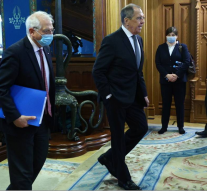
Could the Navanly case further divide Russia and the EU?
Employment and Social Affairs 6 February 2021A Moscow Court sentenced Russian prominent opposition leader Alexey Navalny to prison for more than 2 and a half years on Tuesday 2nd of February, fuelling fresh protests across the country. Russian opposition leader was first detained three weeks ago upon his return to Moscow from Berlin, where he spent several months recovering from poisoning with nerve agent Novichok. He is blaming for this attack on Russian security services and on President Vladimir Putin.
The court on 2nd of February ruled that while Navalny was in Germany, he violated probation terms from a 2014 case in which he had received a suspended sentence of three and a half years. That suspended sentence will now be replaced with a prison term. The judge took into account the 11 months Navalny had already spent under house arrest as part of the decision. He will appeal the verdict, according to his lawyer Olga Mikhailova, but detention for Navalny seems irreversible while it will determine a wider fracture with the European Union.
Meanwhile protests in Russia are maybe the most historic news in this framework, because it is a country where street protests are at least unusual. Off course Navalny case is also sparking new tension between Russia and Eu, alough deterioration of relations between Moscow and Brussels was already settled in at least since 2014.
“The Eu condemns the Russian authorities’ decision to sentence Mr. Navalny and considers it unacceptable as it is politically motivated and runs counter to Russia’s international human rights obligations”, said Eu High representative Joseph Borrell. “The EU reiterates its call for the immediate and unconditional release of Mr. Navalny, as well as all those citizens and journalists who have been detained for exercising their rights to peaceful assembly and freedom of expression. These developments confirm a continuous negative pattern of shrinking space for the opposition, civil society and independent voices in the Russian Federation”, added Borrell, before his visit to Moscow on 4th of February.
Borrell also had a three-day visit to Moscow, where he met Russian Foreign Minister Sergei Lavrov. Questioned by a reporter over the EU’s stance on the Navalny case, Borrell said a “full and transparent investigation” could help clarify what happened to the opposition figure. But he said no EU member state had proposed extra sanctions on Russia for now, and discussions would take place at a European Council summit of EU leaders in March. “While fully respecting Russian sovereignty, “for the EU issues concerning the rule of law, human rights, the secret society and political freedom are central to a common future both for the EU and Russia,” the EU’s chief diplomat said. The EU and Russia “can and must work together,” Borrell added, stressing the importance of the trading relationship.
Even Russian Foreign Minister Sergey Lavrov has branded the ‘lack of normality’ as the key problem in the relations between Russia and the European Union. “Of course, the main issue that we are all facing is the lack of normality in relations between Russia and the European Union, the two biggest actors in the Eurasian space. It is definitely not a healthy situation which benefits no one,” he said when opening talks with Borrell.
But relations between the EU and Russia have been gradually deteriorating over the past decade. The EU has publicly denounced the government of President Vladimir Putin on a variety of issues, such as espionage, cyber-attacks, disinformation campaigns, election meddling and chemical poisonings. Furthermore, the EU periodically renews its sanctions over Russia’s 2014 annexation of Crimea and criticize Moscow for the situation in Donbass.
On the other hand, geographical proximity, commercial links and energy supply issues make the diplomatic relationship crucial for both sides. That’s why, for example, the Nord Stream 2 gas pipeline project from Russia to Germany, despite all this situation, will not be abandoned. German Chancellor Angela Merkel has repeatedly backed this energetic project and has resisted calls to cancel it following the poisoning of Navalny and his arrest.
Moreover, Russia geographically is Europe and there are also close relations at cultural level and among the people. In this sense it is an important development at a social level that the scale of the demonstrations across Russia was unprecedented, while the protest in Moscow was the largest in almost a decade. For this reason, the EU should keep on monitoring the situation on the ground, denouncing abuses by Russian authorities for the sake of democratic transition in the big neighbouring country.
It is particularly alarming in this sense that on 5th of February Russia has expelled three European diplomats – from Germany, Poland, and Sweden – on grounds they attended “illegal” rallies in support of jailed opposition leader Navalny.


